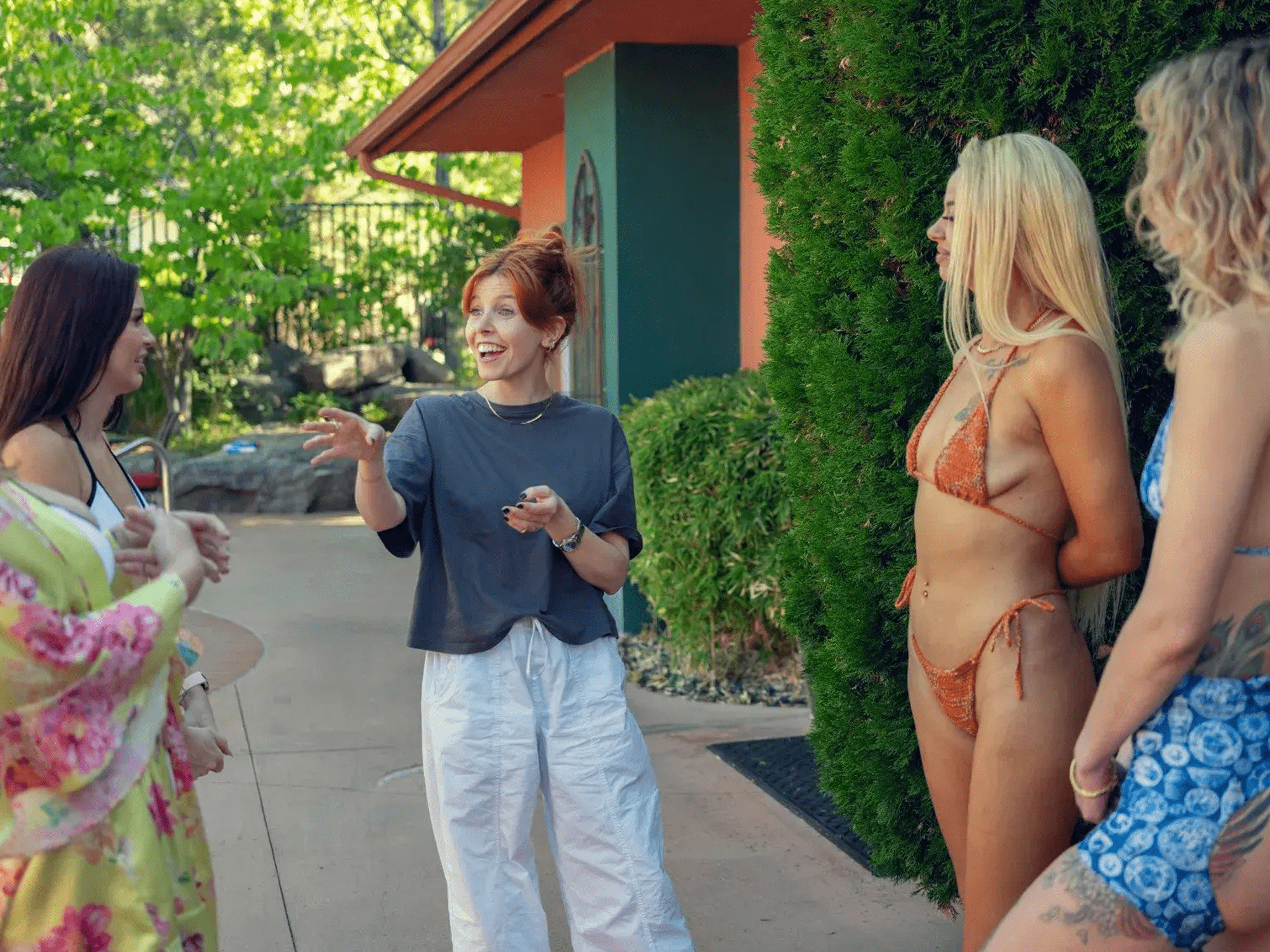Stacey Dooley’s new documentary is a damning case for the legalisation of brothels

Swimming pools, security guards and safe sex may not be the lay of the land in all brothels, but at the oldest legal brothel in Nevada, workers can tend to their clients in comfort and safety, assured they’ll receive their full pay. It’s a far cry from the precarious situations many sex workers are forced into due to the criminalisation of their trade.
When Stacey Dooley arrives at the Mustang Ranch to film the new series of her documentary, Stacey Dooley Sleeps Over USA, she is met by a guard vigilantly manning the gates. Once inside, the saloon-style decor looks like any hotel you might find on the western side of the US. It has a fully-catered kitchen, bar, and rooms where housekeeping can be seen changing sheets. Through a window, Dooley spots the swimming pool. “I feel like I’m at an all-inclusive resort,” she says. But Dooley isn’t spending the weekend at a holiday resort. Set 20 miles east of Reno, the Mustang Ranch is one of 19 legal brothels in Nevada, the only US state to have decriminalised these businesses. For many sex workers in the remaining 49 states (as well as those in the UK), life looks very different from those residing at the Mustang Ranch.
“Many of the sex workers we work with don’t feel safe reporting stealthing, underpaying and violence to the police,” Maedb Joy, Artistic Director of Sexquisite Events, a UK-based performing arts company that platforms sex worker artists, tells HUNGER. “This is especially significant when working with another worker as this actively breaks brothel-keeping laws. One performer we have worked with reported that they were stealthed and then extremely underpaid, with the client only leaving £20 of what was meant to be a £2k overnight booking. They didn’t feel they were able to report it without getting in trouble.”
Back in Nevada, the owners of The Mustang Ranch, Jennifer Barnes and Tara Adkins – both former sex workers – are dedicated to creating a safer environment for those in the trade. Being responsible for 28 women at any one time, Barnes and Adkins employ 49 staff (including 10 security guards) to ensure their safety and comfort. “You can’t really get that anywhere else,” 29-year-old worker Dacé tells Dooley. “We’re so privileged here.” Sexual health is also at the forefront of Barnes and Adkins’ mission. While Nevada law stipulates that condoms must be worn in brothels, and that workers must take regular STI and HIV tests, the ranch has its own on-site medical centre. All new workers at the Mustang Ranch must also go through mandatory training where the madams teach the protocol on subjects such as condom use (which they demonstrate on a dummy affectionately referred to as ‘Chad’).
Though the documentary sheds light on the emotionally and physically draining aspects of sex work, it highlights the increased safety and comfort that comes with legal brothels. A new resident of the Mustang Ranch brings this into perspective when she reflects on her time as an independent worker. “You’re meeting strangers at a hotel,” she tells Stacey. “You don’t know what you’re going to walk into. You don’t know if they have a weapon.” While almost 80 percent of violence against sex workers is carried out against those on the street, illegal brothels – often referred to as ‘saunas’ – also have their dangers. While only six percent of violent incidents take place there, they include everything from armed robbery, arson and assault.
In the UK, while selling sex isn’t actually illegal, the Sexual Offences Act 2003 prohibits the ownership of brothels, defined as a premises “used by more than one person for sex work”. With approximately 72,800 sex workers in the UK – 88 percent of whom are women, the majority mothers – the criminalisation of brothels forces people to work alone, making the job more dangerous. It also prevents workers from reporting crime. This issue has only been exacerbated by increasingly restrictive laws, such as the Online Safety Bill, which came into force last October. Through this new legislation, online adverts for sexual services are now illegal, forcing more workers onto the streets and depriving them the ability to screen clients, as well as to have full control over their rates and services.
A similar 2018 bill passed by Donald Trump in the US – the Stop Enabling Sex Traffickers Act (SESTA) – reveals the devastating effects forecast for sex workers across the pond too. As well as seeing an increase in poverty, the number of suicides, murders and mental health crises among US-based sex workers has also seen a rise. It’s likely that these will only continue to rise as sex work is clamped down on in both the UK and US.
Though Dooley’s documentary reflects the lives of only a small number of women, it demonstrates the huge amount of positive change that legalising sex work can bring to those in the industry. With Belgium becoming the second country globally (after Australia) to decriminalise sex work in 2022, progress is slow. But hope remains that other regions will follow Nevada’s example.




